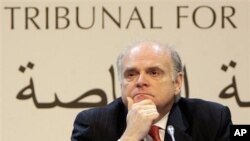The chief prosecutor for the Tribunal investigating the assassination of former Lebanese Prime Minister Rafiq Hariri submitted his indictment to the pre-trial judge Monday at The Hague. The document was sealed and no suspects were identified. The long awaited action had little impact on the streets of the capital.
For months, Lebanese have been anxiously awaiting this moment. But when Special Tribunal for Lebanon Prosecutor Daniel Bellemare delivered his indictment it was done under seal, so there is no new information on who was behind the 2005 truck bombing that killed the billionaire politician,Prime Minister Rafiq Hariri, and 22 others along Beirut's seafront.
Anticipation of the indictment from the UN-backed court, however, has thrown this tiny country into a political crisis, with ministers from the Shi'ite Hezbollah political wing pulling out of the cabinet last week and forcing the collapse of the year-old unity government of Saad Hariri, the slain prime minister's son.
It is widely believed that the court will indict several members of Hezbollah. Hezbollah Chief Hassan Nasrallah has dismissed the Tribunal as a tool of the West and warned Lebanese not to cooperate with it. Hezbollah now says it will not accept a new prime minister willing to work with the court.
Political consultations were due to begin Monday on forming a new government, but the president postponed them until at least next week.
Shortly after that announcement, a brief statement came from The Hague saying the prosecutor had submitted an indictment and supporting materials to the pre-trial judge. The judge's review of those documents is expected to take several weeks.
On the capital's bustling Hamra Street, life went on as normal. Jaded Lebanese say they are used to crises in their country and the fact that the court is moving forward, coupled with the collapse of the government, will not, as some analysts have warned, throw this multi-religious country back into conflict.
Adnan al-Arab, 48, a taxi driver, says there is the Tribunal, there are accusations, but the politicians will resolve it among themselves. He says it does not concern us, we the Lebanese people are united.
Mohammad, 51, a real estate entrepreneur, says the current situation will improve. He pointed to recent initiatives by Arab neighbors to try to calm political tensions, and says he thinks there will be Arab help to resolve the crisis before it escalates.
Three university friends sitting outside at a coffee house on this mild winter evening expressed their indifference. Ali, 24, noted that nothing has changed in Beirut since the government collapsed last week.
His friend, Karim, 20, agreed and said even if the situation turns, the Lebanese will cope, they have a talent for that. "What happens, happens. We have to adapt," he said.
Jad, 21, was more philosophical, saying, "Everyone in Lebanon, they live together each and every day. But when some political leaders decide that now we should have a fight, we have a fight. It's not spontaneous. People don't hate each other, they just follow their political leaders and what they say."
On Monday evening after the indictment was transferred to the judge at The Hague, those usually vocal political leaders were unusually quiet and absent from their regular platforms on the evening news.
Hariri Tribunal Prosecutor Submits Indictments




